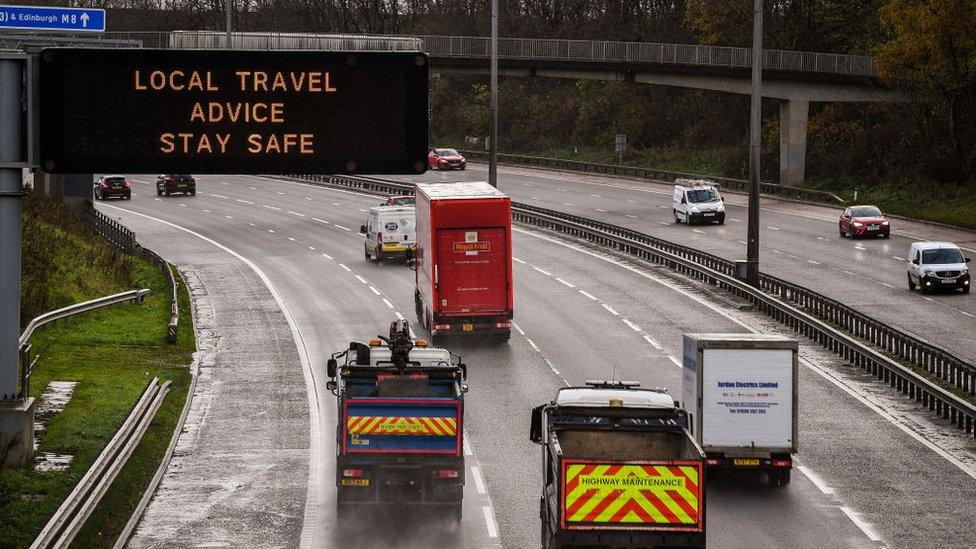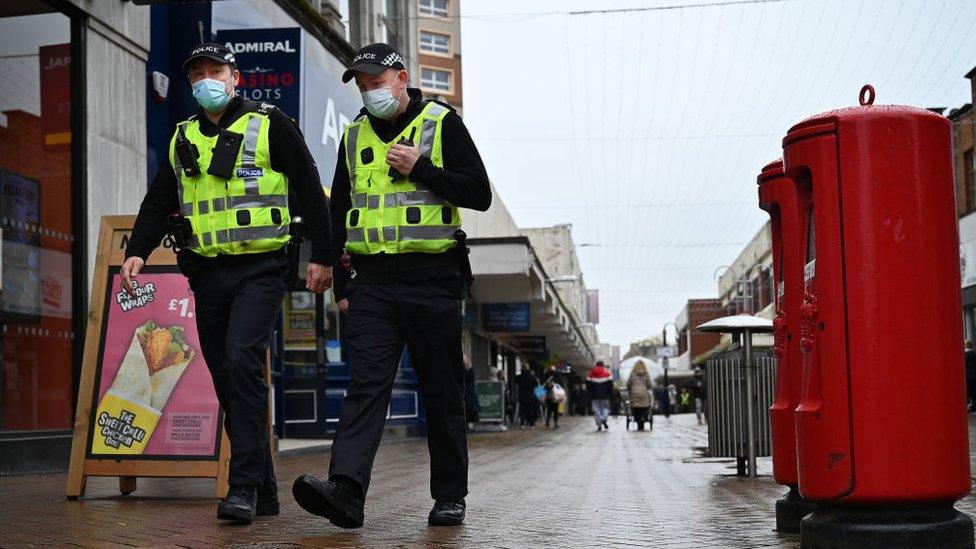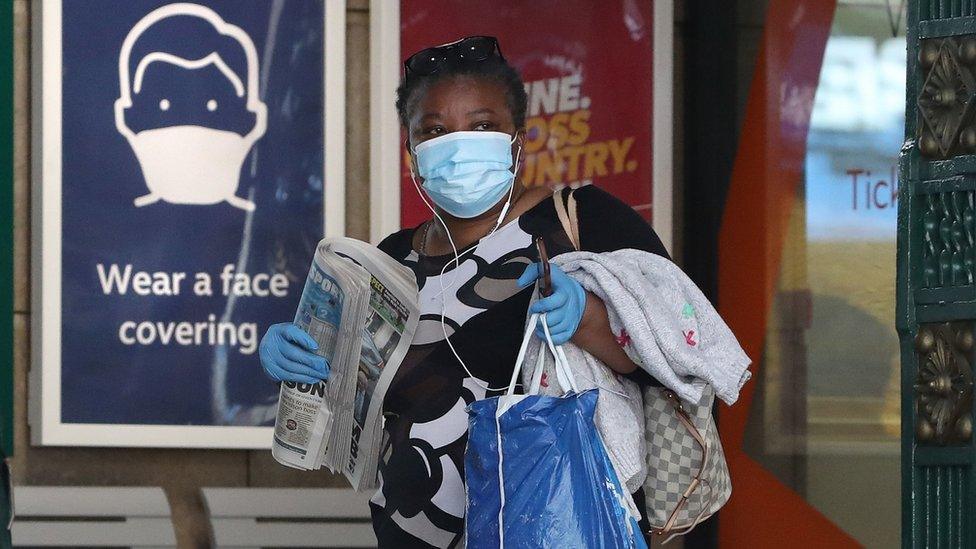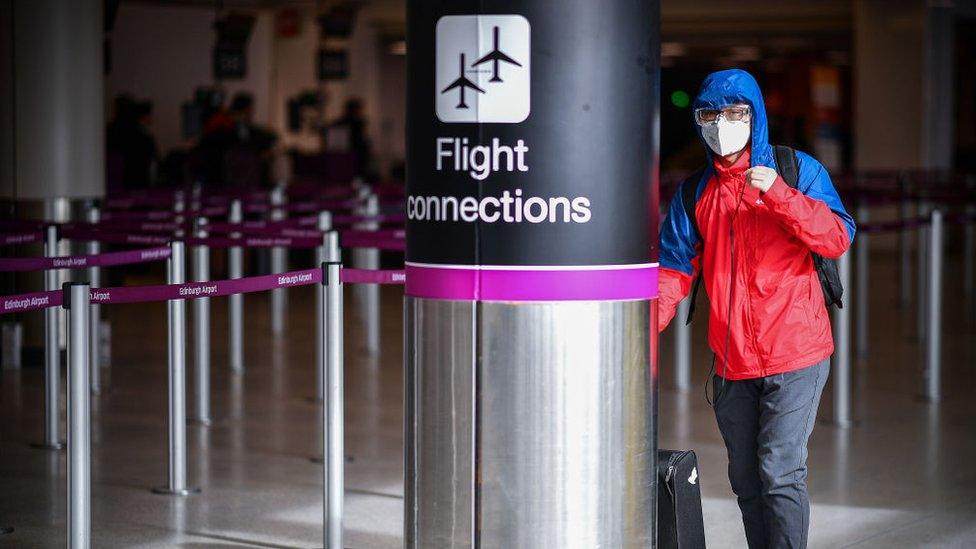Covid: What are Scotland's new travel restrictions?
- Published
- comments

Strict new rules on travel in Scotland come into force at 18:00 on Friday, with police being given the power to fine people who do not comply.
The move coincides with more that two million people across 11 council areas in western and central parts of the country moving to the toughest level four coronavirus restrictions.
The Scottish government says the new travel laws are needed to prevent the virus spreading to areas where it is currently less common.
Can I still travel around Scotland?
It really depends on why you are travelling, and where you are travelling to.
Everyone living in a level three or level four local authority areas must, by law, remain within their own council boundaries unless they have a "reasonable excuse" for doing so.
People in level four must also keep journeys within their own area to an absolute minimum.
Meanwhile, people in level one or level two areas must avoid any unnecessary travel to areas that are under level three or four restrictions and should minimise unnecessary journeys between areas in different levels.
What is a reasonable excuse for travelling?
The Scottish government has published a lengthy list of reasons, external that would allow people in the highest two tiers to travel outside of their own area.
These include things like travelling to and from work if you are unable to do it from home.
Students can still travel to schools, colleges and universities in other areas, and are able to return home from boarding schools or student accommodation at the end of term.
You can also travel for "essential shopping", either for yourself or for a vulnerable person, but should use online shopping or retailers in your own area wherever you can.
In level three only, someone who lives next to a local authority boundary can cross that boundary for nonessential shopping if that retail outlet is in the immediate vicinity of where they live.

It is also legal to travel for shared parenting and other childcare reasons, to help a vulnerable person or to use essential services such as hospitals and social care.
People can also travel up to five miles from the boundary of their council area for outdoor exercise such as walking, running or golf in groups of up to six people from no more than two households.
And it is fine to travel through a level three or four area by road or public transport if your journey begins and ends in a level one or two area.
How are the new rules being enforced?

Travel restrictions have previously just been guidance - but will now be enforceable by law.
This means people can, in theory, be fined by the police if they don't comply.
Fines for breaching coronavirus restrictions start at £30, doubling to £60 if they are not paid within 28 days. Repeat offenders can face penalties of up to £960.
But senior Police Scotland officers insist this will only happen as a last resort, and where there has been a flagrant breach of the rules.
Vehicles will not be routinely stopped, for example, and there will be no road blocks.
The force says its officers will use "common sense and discretion" if they do come across people who are travelling from one local authority area to another.
Scottish Labour has warned that the rules could confuse and unfairly criminalise people, and wants to block the prevent the restrictions becoming legally-enforceable.
And the Scottish Conservatives have said there were "serious legal questions" to be asked about whether the regulations were within the competence of the Scottish Parliament.
Are buses and trains still running?

Yes, public transport will continue as before across the country. Again, though, people in restricted areas should limit their journeys and only use buses, trains or taxis to travel to other council areas if it is essential.
Everyone will still need to wear a facemask on public transport, unless they are exempt, and should follow social distancing rules.
And you should avoid sharing a vehicle with people who are not members of your own household or extended household as much as possible.
If you have no other option, you should keep as far apart in the vehicle as possible, wear a face mask and keep the car window open for ventilation.
What about travelling to other countries?

The current restrictions mean that people should not travel between Scotland and England, Northern Ireland, Ireland or Wales unless it is essential.
People living in level three and level four area should not travel abroad for non-essential reasons, including for holidays.
Those in levels one and two have been strongly advised not to travel overseas by the government unless it is essential.
But it is still legal for them to go on holiday, and they are allowed to travel to airports, railway stations and ferry terminals in level three and four areas in order to do so.
Travellers arriving back in Scotland from many overseas countries will still be required to self-isolate for 14 days.

